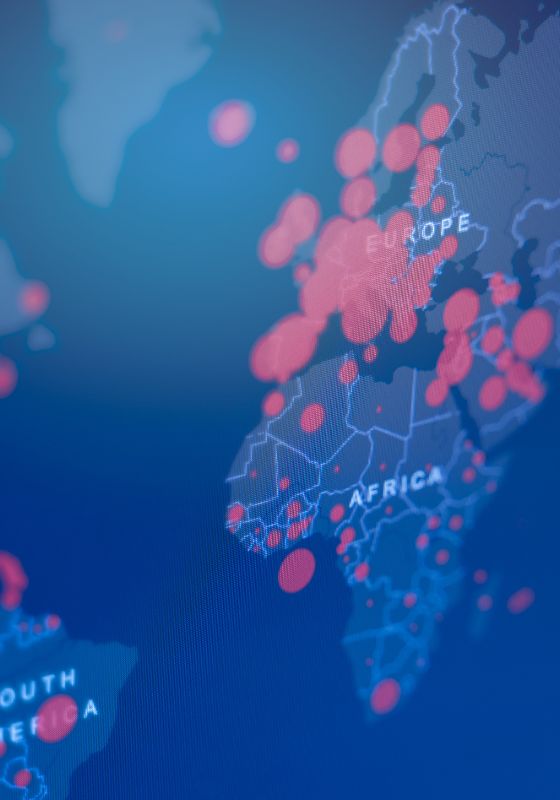More than a century after Rio de Janeiro’s 1904 riots against mandatory smallpox vaccination, the World Health Organization announced the COVID-19 pandemic in March of 2020. This once again left Brazil in a state of uncertainty, surrounded by misinformation and mistrust.
Due to the extreme right-wing government elected in 2018, when the pandemic came, the nation became a clear example of how a political climate can exacerbate a pandemic instead of containing it. In fact, Brazil had the second-highest number of COVID deaths in the world, with a death toll above 686,000 (as of October 2022) and the 13th highest death rate, with an estimated 3,170 per 1 million inhabitants.
“We need to think about how we can handle future pandemics, because in the end, we know they will come.”
While many governments around the world adopted different strategies to limit travel and increase investments for scientific research and health improvement projects, the Brazilian population witnessed their leaders deliberately refuse expert recommendations on how to contain the virus.
The country’s public servants systematically disregarded recommendations on public use of face masks, social isolation decrees, and vaccine purchases, even as they encouraged crowds and advertised unproven COVID-19 drugs. These actions contributed to approximately 120,000 preventable deaths in the first year alone.
The pandemic opened old wounds in terms of public disregard for human life – especially the lives of the most vulnerable. This was worsened by the government’s rejection of scientific evidence and the spread of fake news, coupled with the increase in highly polarized online conversations and a continued disregard for human suffering.
Even though science has helped us eradicate endemic and epidemic diseases in the past, we as a global society are still approaching health irresponsibly, making costly mistakes that result in loss of life. This raises an important question: What can we do to stop repeating the same mistakes?
We need to think about how we can handle future pandemics, since we know they are bound to appear.
“By studying the past, we can change the present and prepare for the future.”
In 2021, a group of professionals from all over Brazil proposed a new project: The Brazilian Pandemic Museum. Currently in the feasibility and fundraising phases, the Museum seeks to memorialize and share an understanding of the COVID-19 pandemic, especially its social impact, the public health system’s response, the policies adopted, and, above all, society’s ability to cope with the virus.
As part of this effort, the Museum is looking at Brazil’s history and the pandemic’s effects on the most vulnerable populations. It will shine a light on the virus’ victims to encourage society to empathize with their suffering. Building on this empathy, the Museum will help them see the causes behind the disproportionate impact COVID-19 had and continues to have in Brazil.
The Museum will be a place of remembrance for all those lost to the virus, joining an international movement that encourages us to learn from the past and embrace knowledge. It will help people get in touch with issues related to remembrance, science, and accountability, inspiring us to learn from history so we can ensure we do not repeat our past mistakes. One of those mistakes was how the government shifted concern away from the global health crisis by drawing public attention to climate change and claiming pandemic public health policies violated human rights.
By highlighting what went wrong, this project intends to serve as a wake-up call for future generations about how certain behaviors — especially from those responsible for the care and protection of citizens’ lives — are unacceptable. This museum is designed to strengthen the democratic culture in Brazil and create a new sense of citizenship, responsibility, and concern for others, one based on human dignity and the values that underpin human rights.
While a museum cannot prevent future epidemics, the Brazilian Pandemic Museum provides crucial insights into how the next pandemics can and should be addressed.
In a country that has systematically refused to learn from its mistakes, this museum represents a very important turning point in how the nation can approach the structural violence within it in a critical and honest way, while still maintaining the sensitivity necessary to empathize. This will contribute to a better future, guided by ideas of solidarity and social justice, in Brazil.
Clara Ramírez Barat Directora del Programa de Políticas Educativas Warren en el Instituto Auschwitz para la Prevención del Genocidio y las Atrocidades Masivas
Leandro dos Santos Magalhães Arquitecto, socio y co-fundador de Equipe B Arquitetura





